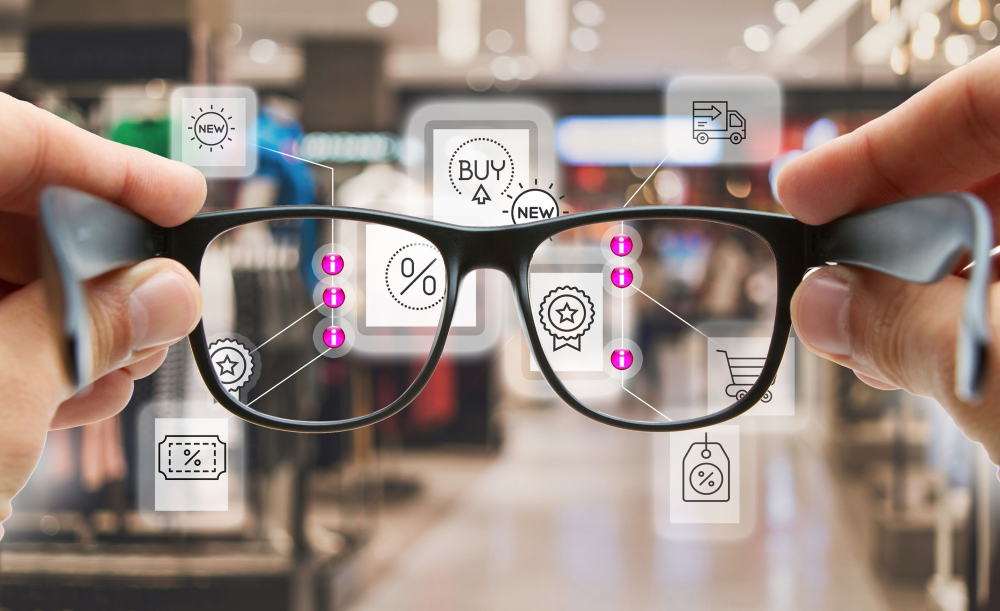by Fraser Hibbitt for the Carl Kruse blog
Google released a pair of Smart-glasses for public consumption in 2014 only to be discontinued by 2015; a year of poor sales and public scorn (the neologism glasshole was created) had curbed enthusiasm. Google did manage to figure out a use for the expensive item by selling them to businesses under the promise of increasing efficiency – on the official Google Glass website it claims the glasses improve accuracy and help employees stay focused.
Google missed the mark, or, perhaps they were too early to the finish line. Apple too has been working on their own set of ‘Smart-glasses’, and having the record of the Google Glass fail, they can evaluate what they might need to do to not end up in the same mire; their judgment of cultural acceptance is around 2022. I recently read an article which, quoting a spokesperson for the product, claimed that by 2035 having AR (Augmented Reality) glasses will be much the same, as endemic as, the individual having a smartphone.

It’s obvious that we have become somewhat infused with technology by the birth of the smartphone. It can measure our health, keep our journal, and save personal memories. It is a presumption of technology that it somehow, if not enriches, makes our lives easier. When we think about the Industrial Revolution and the increasing patents on technological breakthroughs, it seems to be telling us of progress; of our creative ability to master the elements and provide a fundamental difference in society. Not that this is not still in the minds of many, but the advent of personal technological possession has created the need to develop instrumentally alluring, practically questionable, products.
Now, what do we want from Augmented Reality, or what does AR want from us? The Apple glasses will put a virtual reality between the wearer and the world. What this virtual reality will consist of will be a practical, efficient, way of interpreting the world according to the individual’s desire. Another idea, highly prized, would be world-scraping, meaning that the glasses would take data from this individual’s life to gauge what kind of person they are, akin to the use of advertising based off our browsing history. However, here, it is believed that the glasses could hone in on the user’s perception, picking up data from how they attend to the things they browse. Apple wants to quantify our attention and make a world out of it.
If the prediction for AR to be unavoidable by 2035 can be used as a cultural clue, then it seems worthwhile to stop and think what this might mean. It creates a judgment on technological direction and presumes the cultural climate around technology. It is presuming what the individual is looking for in technological advancement. It is, of course, always down to the individual as to how they use their personal technology, but if certain processes of life become unavoidable without it then the individual is now forced to forego their choice in the matter.
It attracts interesting questions about the idea of what an individual is, and because this is largely down to dispute, with no finalized conclusion, personalized technology can keep driving forward this agenda of improvement. It is a difficult thing to argue for, or even about, when it comes to issues such as these. Questions like when should we stop?, how should we stop?, and do we have enough? come to mind. Will enhancing personalized technology offer some new understanding of the individual? Probably not, because this technology only wants to embellish existence, not understand it; it gathers data on compulsive behavior because it can be quantified.

Photo Credit: Insight.com
It is quite easy to go down the slippery slope of reason, which would eventually banish the individual: technological efficiency slowly impinged upon the individual until the individual’s view of the world becomes an anomaly. There is, perhaps, a source for this kind of thinking, but there is no way to tell how individuals will take to AR. The Google Glass failure is a fact and tells us something of a culture not interested, yet, in this endeavor. We are still in the seat of the smartphone. Yet when we look closer at this fact something becomes apparent.
The smartphone offers an augmented reality of its own; part of our selves are transferred to this device, and we can use it for own demands, our curiosities and insecurities: checking our movements, searching facts and being on top of world-wide events. What made the Google Glass so off putting was its lack of subtlety. The fact that our visual perception would be directly encroached upon, and our fashion statement misaligned.
When we think of what we know of the world: how our experiences shape us; how we change, grow, and live as people; how we find our own ‘facts of life’. It is daunting to think of this process as curbed or controlled. There is a clear cultural anxiety around this subject which we see played out in movies, TV shows, and books. They are designed to make us wonder where we are going with technology and what kind of society we want. This anxiety highlights an ambivalence we foster towards technology. We may think that tech-businesses create unwanted needs, manipulate us, but, after the heated thoughts, one always has a choice. We want efficiency, accessibility, but we also want privacy, solitude; a life on our own terms.
Personalized technology should not force us to make a false choice, we should not have to feel we are giving up the ‘modern world’ by opting out of a purchase, an upgrade. The choice should not be dictated by anyone else but the individual. Technology is made by the human for the human. If it is dictating how we live, then the fault may not lie in technology. If augmented reality seems to distrust reality in its aim for practicality, it is only because we too distrust reality, and, perhaps, ourselves. We are, as always, poised between that unknown of reality and that comfort of which we have made our own.
AR wants to comfort us as we are already comforted by personalized technology. Put that way, it is not much of a leap. When we think of how our perceptions, visual or other, are affected by personal technology already, AR seems a reasonable step. Google Maps does not explicitly interact with my visual perception, but it can lay out a path for me. This is one way of looking at the progression. However, we must ask the question: What do we lose by this? What if we found our own way to our destination? Do we want to be defined by what is quantifiable about us? The fact that personal technology can provide a basis for how we encounter the world, forces us to have a conversation about our own notions of self-reliance. What is hoped for is that personalized technology secures our ability to meet the world, not estrange us from it.
==============
Home Page for this Carl Kruse blog: http://carlkruse.at
Contact: carl AT carlkruse DOT com
Other blog posts include those on internet culture, the war of art, and on social influencers.
The blog’s last post was life of a Victorian myth.
Find Carl Kruse also on Goodreads.

For me give me Google Glass, give me whatever comes next, give me what comes after that. 🙂
For me I am happy to see what the future brings. 🙂